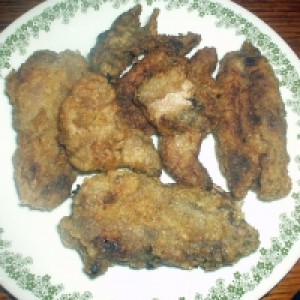Food, Glorious Food!
She’d taken the deer roast out of the freezer to defrost it, and was soaking the beans for supper when she thought maybe she would go to WalMart. Then, she decided, no, it’s such a nice day, I’ll just go outside for a walk instead. Within a minute my mother was lying on the concrete of the driveway, out of earshot of the house, unable to get up. Luckily, my brother, Ed, was on his way over with some squirrels for my mother to fry up, and less than a minute after she’d fallen, he arrived, found her on the ground and brought her to the emergency room. She was more worried about her deer roast and beans than she was her broken hip and shoulder.
Following successful surgery, my mother is now in rehab in Indiana and, for the first time in God knows when, she won’t be cooking three meals a day any time soon. My mother, as the eldest of seven, and then the mother of eleven, has long had to creatively whip something up out of nothing for others to eat. My childhood was filled with “casseroles” which, though you’d never know to look at them, were tasty. Beef, corn, macaroni, stewed tomatoes and peas were regularly tossed together, baked and served for supper.
Unlike my mother, I’m not one to caretake others by feeding them, though I do make a mean cup of tea. If only my children were interested in spiritual nourishment and talking to me about this week’s Torah portion and the significance of stones in the story of Jacob’s dream about angels cavorting on the ladder to heaven, I would be considered an excellent mother! Instead, they want to be fed. My daughter, Anna, regularly rummages through the refrigerator searching for a container of yoghurt that hasn’t exceeded its expiration date, while at the same time purging the refrigerator of questionable items. This is one of Anna’s favorite recreational activities, and I’ve told her that I purposely don’t throw out moldy cheese because I hate to deprive her of the pleasure. She doesn’t believe me.
The week after my mother fell, my siblings and I all check in with each other, even more often than usual. It’s random stuff, but much of it is linked to food. It’s as if I’m getting a message from heaven. My sister Wanda texts me, “Just brought daddy some moonshine jelly.” I text her back, “Where did u get moonshine jelly? What does it taste like? I want some badly!” and she replies, “Darn, should have told me. I don’t like it as much as the peach pecan amaretto. That is yummy.”
Mary calls to say that she’s planning a chili cook-off for the family, when will I be home? I love chili, but it’s not something I make often in my Jewish, New York City world. I tell Mary I once had peanut butter and chocolate chili. It was awful.
Then, my sister Liz calls to taunt me, “I’m eating the heart of the cabbage,” and I laugh, “Next thing, you’ll be gloating over chicken gizzards!”
“The heart of the cabbage” is a reference to the inner section of the cabbage that is left over when you grate cabbage for cole slaw. Liz and I fought over that sweet heart when we were kids. We also fought over gizzards.
Reminiscing over the phone on our simple childhood food pleasures, Liz says she still likes gizzards, “But I can’t have tongue!” referring to beef tongue that my mother would cook and put into hash - a soup made of diced potatoes, onions and diced tongue, and which my father refused to eat. (We know for a fact that our mother slipped tongue into other dishes just to annoy him, which amused us greatly back then, and still does today.)
“I can happily have tongue,” I say, “any way I can get it,” and Liz, God bless her, still laughs at my juvenile, dirty joke.
“Why can you eat the hiney butt of a chicken, but not a cow’s tongue?” I ask Liz. “Where do you draw the line?”
Having converted to Judaism long ago, I’ve learned that keeping kosher is all about drawing that line – you can eat this, but not that. I send kosher, prepared food to my older son, David, in college in Minnesota because he doesn’t have access to kosher meat. Even though I don’t actually roll up my sleeves and slave at the hot stove, simply choosing the food from the kosher butcher is a bit of an ordeal for me. Luckily, the last time I shipped David food, our cousin, Beverly, accompanied me and she steered me through the correct amounts to order, based on how many meals I wanted him to have for the next two weeks. Beverly also asked the butcher to divide it into single portions so it could be defrosted individually and wouldn’t all go to waste. For four years I’ve been sending David food, and this solution never occurred to me.
My sister-in-law, Debbie, calls not long after Liz and I have finished our tongue-talk, and she is all frazzled. She’d just gotten back from Glicks, the kosher supermarket in Florida that she frequents and which practically requires steel-tipped, combat boots to maneuver through the single-minded manic Jews pushing grocery carts who are on a chopped liver mission. Debbie had taken a deli number and then left the deli area for a few minutes to finish up her shopping. When she returned to the counter and her number was called, Debbie was unfairly accused of picking up a number from the floor in order to get ahead in the line! Waiting for her order to be packaged up, Debbie listened and watched as another woman pointed to the rotisserie chickens laid out on the tray, and one by one refused them, Goldilocks style – too big, too, little, too well done… Finally, in frustration, the deli man said, “Lady, just tell me which chickens you DON’T want!” I pray that Glicks is not in my near future because while I will spend an inordinate amount of time poring over the stone motif in the Jacob narratives, I simply can’t take underdone chickens too seriously!
Debbie asks me when I’m going home to see my mother and I say, “I’d like to wait until she gets out of rehab so I can help her at home, cooking and stuff.”
Debbie says, “That’ll be great!” and I know I’m paranoid, but her voice seems a little too hearty to me, as if the last thing she can imagine is me cooking for my mother. (My conversion to Judaism, Debbie has often remarked, was completely successful in every respect except the food aspect.) However, I realize that I do want to attempt to mother my mother in the way in which mothers, Jewish and non-Jewish, typically do – providing them with food. I won’t do it nearly as well as she has mothered us, and there’s no way I’ll fry up a squirrel for anybody, but she’ll like my chili. I make it just the way she does.
![[the current issue of ZEEK]](../../image/2/100/0/5/uploads/leftistethicistgraphic-52842c6a.png)
- 5000 Pages of Zeek
- Founded in 2001, Zeek was the first Jewish online magazine, and we have over 5000 pages online to prove it, all available free of charge. Read more in the Archive.
More articles by
Angela Himsel
More articles in
Arts and Culture
- Euphoria, Curiosity, Exile & the Ongoing Journey of a Hasidic Rebel: A Q & A with Shulem Deen
- Poet Q, Poet A: Jews Are Funny! Six Poets on Jewish Humor, Poetry & Activism and Survival
- Tackling Hate Speech With Textiles: Robin Atlas in New York for Tu B’Shvat
- Fiction: Angels Out of America
- When Is an Acceptance Speech Really a Speech About Acceptance?



